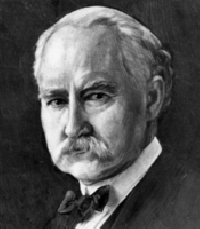Fall, Albert B.
Albert Fall (1861-1944), who served as U.S Secretary of the Interior, became famous when he resigned over his ethically questionable management of the nation's oil resources. As an outspoken member of Congress from New Mexico, Fall represented the western interests who felt betrayed by the perceived overly-zealous control that the federal government was beginning to exert over the development of public lands.
In New Mexico, Fall owned a ranch that spanned more than 55 miles in length and 35 miles in width. He had been a judge and a sheriff. Throughout his public life in New Mexico, Fall referred to the territory as "corporation country." He hated government interference in business. "I have long believed," Fall said in 1918, "that the laws should protect…capital and should be so enforced as to offer an inducement for its investment." He also publicly stated that: "All natural resources should be made as easy of access as possible to the present generation. Man cannot exhaust the resources of nature and never will."
Thus, in 1921 Fall was an interesting choice to serve as Secretary of the Interior by President Warren Harding. That same year, control of Naval Petroleum Reserves at Elk Hills, California, Buena Vista, California and Teapot Dome, Wyoming was handed to the Department of the Interior under executive order from President Harding. Later that year, Fall, as head of the department, allowed two of his friends, Harry F. Sinclair (Mammoth Oil Corporation) and Edward Doheny (Pan-American Petroleum and Transport Company), to lease part of these Naval Reserves without any competitive bidding.
In Senate hearings on the matter, Edward Doheny admitted that he had lent Fall $100,000, interest-free. Some accused Fall of conspiracy and of accepting a bribe and in 1928, Fall was convicted of lying to the Senate committee when he declared that he had not accepted any money. Fall was found guilty and sentenced to one year in prison and ordered to pay a $100,000 fine. He was the first member of a Presidential cabinet to serve time in prison. Albert Fall made the words “Teapot Dome” a synonym for scandal in the United States. In 1927, the Supreme Court decided that the oil fields leased by Fall to Sinclair and Doheny would be returned to the U.S. government.
While Fall was held accountable for his abuse of power on the federal lands, his basic idea of unfettered development and unending abundance remains on the table. The debate over the development of energy resources on public lands continues to be a hot-button-topic today, particularly in the American West.
Further Reading
Albert B. Fall's Career Ended in Disgrace (Borderlands, An El Paso Community College Local History Project)
Fall, Albert Bacon - Biographical Information (Biographical Directory of the United States Congress)
Stratton, David. Tempest over Teapot Dome. Norman: University of Oklahoma Press, 1998,
